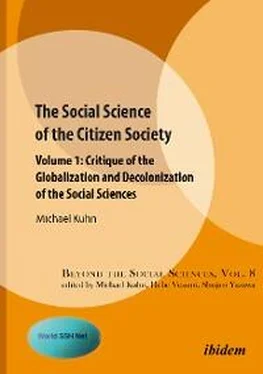ibidem-Press, Stuttgart
BEYOND THE SOCIAL SCIENCES
The social sciences, what do they let us know about the world's social, a place of war, of poverty, and of wealth? Certainly, one cannot make them responsible for what is going on in the world. Is there any spot on the globe that is not somehow involved in a war? Is there any place in the world, where the growth of wealth does not exist next to the growth of poverty? Certainly, war, wealth, and poverty are the major essentials of "modernity" and they have been in the forefront of social concern for more than 200 years. The social sciences have been researching the social world with a multitude of professional thinkers also for over two centuries. Has the knowledge they gained helped to make anything better, or at least helped to reduce wars and poverty? Obviously not. Or is even the opposite is the case? Again, one cannot accuse the social sciences for this, knowledge is knowledge, but what is their impact upon the world? Not much, one must conclude, considering the fact that we still live in a world of war, wealth, and poverty. Hence, we have to raise the question what social thought under the regime of the social sciences is all about then.
The book series "Beyond the Social Sciences" publishes social thought and invites readers and writers to reflect on the social sciences and their approach to social thought, the theories they contribute to understand the social world, and how to go beyond the social sciences’ way of thinking about the world.
It particularly invites contributions that critically reflect upon:
the disciplinary structure of social sciences
key theories founding global social science theorizing
epistemological and methodological issues of global social sciences
institutional aspects of global social sciences
international collaboration practices
the global social science structure
international discourse practices
international science policies
alternative approaches to social thought
Series editors are:
Michael Kuhn, World Social Sciences and Humanities Network (World SSHNet), Achim
Hebe Vessuri, Universidad Nacional Autónoma de México (UNAM), Mexico City
Shujiro Yazawa, Seijo University, Tokyo
200 years of critical social science theories, two hundred years of poverty, two hundred years of war, 200 years of colonialism and imperialism, constantly criticized by the professional thinkers of the social sciences—how does this two-hundred-year coexistence of critique and criticized go together?
These two books on the “social science of the citizen society” accuse the latter, which social science theorists do not believe to be possible, of producing not only occasionally, presupposed, that is false theories about the world—wrong, because they criticize the world as a failure of the ideals imputed to it, thereby critically affirming them and thus pursuing the coexistence of critique and the criticized.
The first book on the “Critique of Globalization and De-colonization of the Social Sciences” shows that the arguments with which they justify both what globalization and the de-colonization of their sciences are supposed to be are nothing but preoccupied, false justifications legitimizing the concerns of individual nation-state views of the world. The second book on “The Nature of the Social Science of the Citizen Society—Sketches of a Theory” shows that in the way in which the disciplinary social sciences create their theories by looking at the practical concerns of citizen society, how it thereby produces preoccupied, i.e., false theories about the citizen society, in particular about their state—with the result of this never-ending coexistence of the critical and the criticized.
Such a project that sets out to criticize social science thinking for not only producing occasional false theories, but for being the nature of this kind of thinking about societies, for producing false theories, false theories that, thanks to their false thought, spread critically affirmative legends about the goals and purposes that govern this world, this project is doomed to failure from the outset—at least from the point of view of this social science thinking.
Thanks to its concept of knowledge, social science thinking is in fact immune to a critique that criticizes wrong thoughts. Social sciences are convinced that thinking about the social—and since the interpretation by the social sciences of T. Kuhn’s book about the natural sciences also the natural sciences’ thinking about nature—cannot produce correct knowledge, but only relative correct knowledge, relative to the meta-theories, definitions and methods this thinking applies. Social science theories can indeed be criticized, but this criticism cannot be a criticism of a false theory, but a criticism that argues against all the ex-ante definitions, ethical, scientific-theoretical and methodological assumptions, ex-ante decisions about the object of a theory and about the way in which thinking intends to tackle it, ex-ante decisions that social science thinking must make and whose reasoning it must disclose. The critique that a theory creates wrong thoughts is not an option in social science thinking, because theories can only ever be relatively wrong or right theories measured against all their assumptions and definitions.
Nonetheless, since even all the resulting tautological cognitive operations of a critique of theories that are wrong in this relational sense, like any scientific argumentation, require a plausibility, because they are operations of scientific thinking, these tautological operations of relational critique also cannot do without reasoning. No scientific thoughts can do without their reasoning, which explain why a theory thinks what it says.
And this, the inescapability of theories from the reasoning of scientific thoughts is the weak point in the social science immune system against criticism of false theories, because not least of all, this critique immune concept of criticism, immune against the criticism of false theories, must itself also reason why there can be no right and wrong theories and why this theory about the impossibility of criticizing false thoughts, which makes social science thinking immune against criticism, is itself a right theory.
This, the inevitability of reasoning theories, of scientific thought, also of reasoning why it is right that theories can only ever be relatively right, is the reason why it is still worth trying to criticize social science theories for creating wrong theories, although wrong theories—following the social science theories about social science thinking—do not exist in social science thinking.
Contents
Preface
Introduction: The “Globalization” and “De-colonization” of the Social Sciences
Globalization
De-colonization
1. The “Globalization” of the Social Sciences—the Introduction of Nationalist Thinking into Social Science Thinking
1.1 Social sciences before their “globalization”: Idealizations of citizen societies and their state
1.2 Globalized theories—nationalistic self-portraits of states
1.3 Comments on life in the world of national citizen societies and its social sciences legends
2. The Final Worldwide Enforcement of the Social Science of the Citizen Society through Its “De-colonization”
2.1 The adoption of the knowledge concept of social sciences in the former colonized world through the critique of “Eurocentrism”
2.2 The place of thinking as the “contextual” source of knowledge
2.3 From the critique of capitalism to its anti-critique—from Marx to Heidegger
3. Indigenous Knowledge—Contributions to the Ideological Armament of States
Читать дальше












